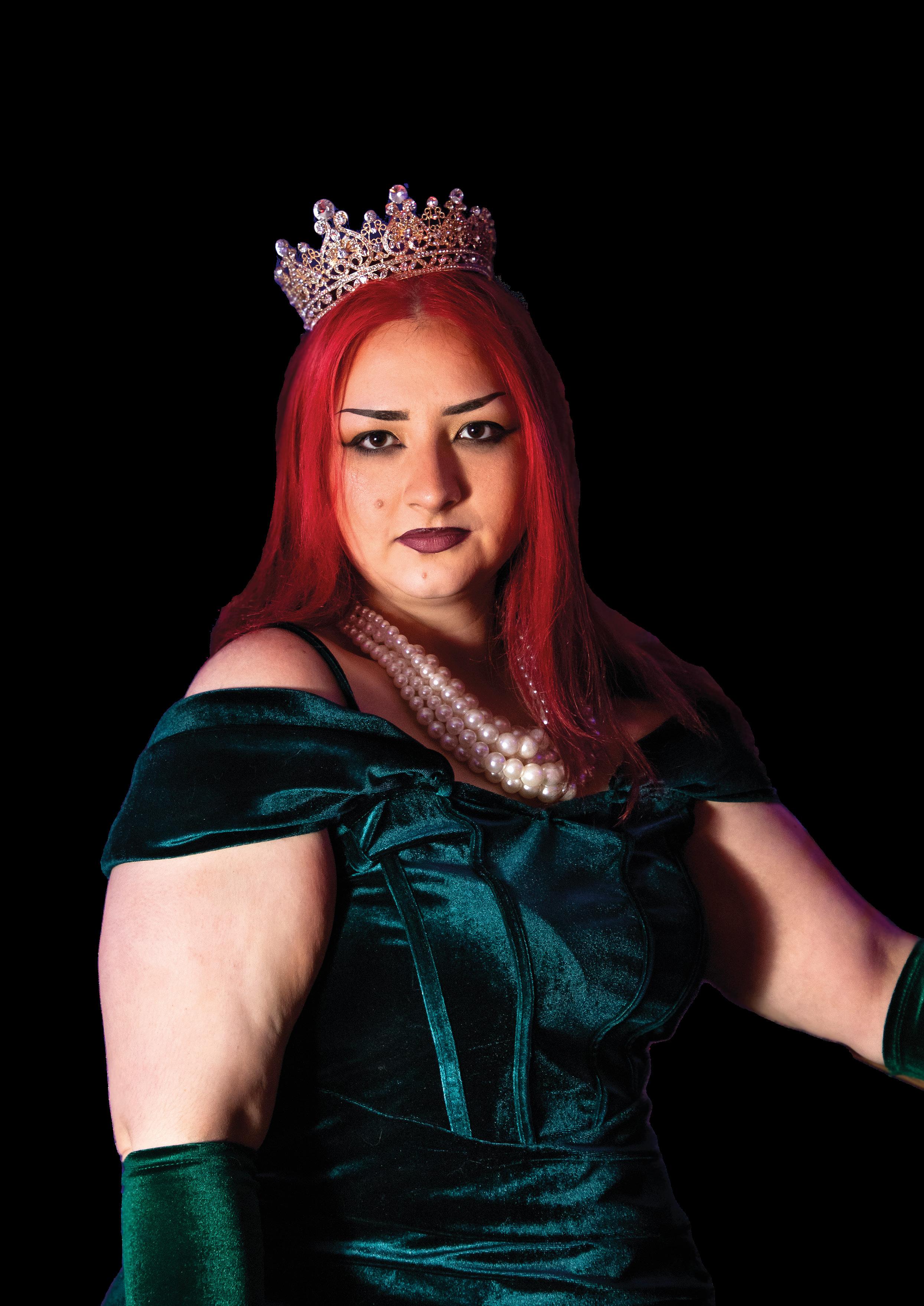
The of Clubs Gender Recognition • Inclusive Barber • SNP Leadership

We are facing a time of peril. Everyday our rights are being threatened, our livelihoods are being punished, and our communities are being denied a voice. It is more important than ever that we live our lives as authentically as possible.
The theme of this issue of Gey Scotia is “Express Yourself”, based on the wise words of queer icon Madonna. It is important we do this in a variety of ways: expressing our differences, expressing our views, or expressing our love.
This issue will touch on a lot of topics but at its core it is about empowering and uplifting stories that are fighting against the endless torment we seem to face. It is about looking at the dystopian-like climate we live in and seeing the light at the end of the tunnel. It is about accepting that whilst we can come along way, we need to work together to not only fight for equal rights but ensure we retain the rights we already have.

At times this ongoing culture war has me completely exhausted. But whilst writing all of these articles it is clear our community is still strong, and we will continue to flourish.
Thanks for reading,
Arran Proctor Editor-in-chief

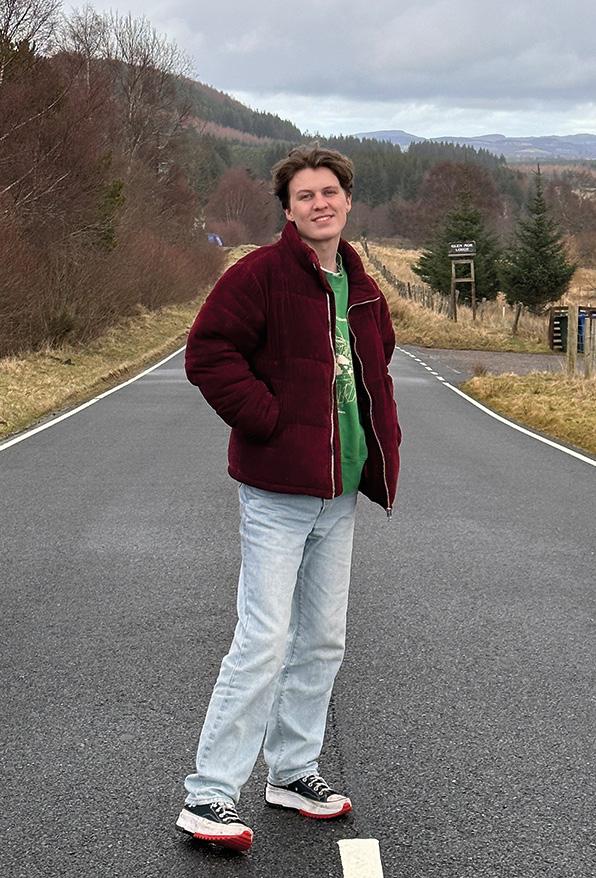
EDITOR'S LETTER
CONTENTS
Tracks Monday's Lucy on trans inclusion and the Scottish drag scene

4 | geyscotia.com 10
6.
5 queer romance films to get you ready for summer
8.
Stag Barber: Haircuts for everyone
Scotland's Transitioning and Transforming Drag Scene The equal marriage debate in the SNP leadership contest
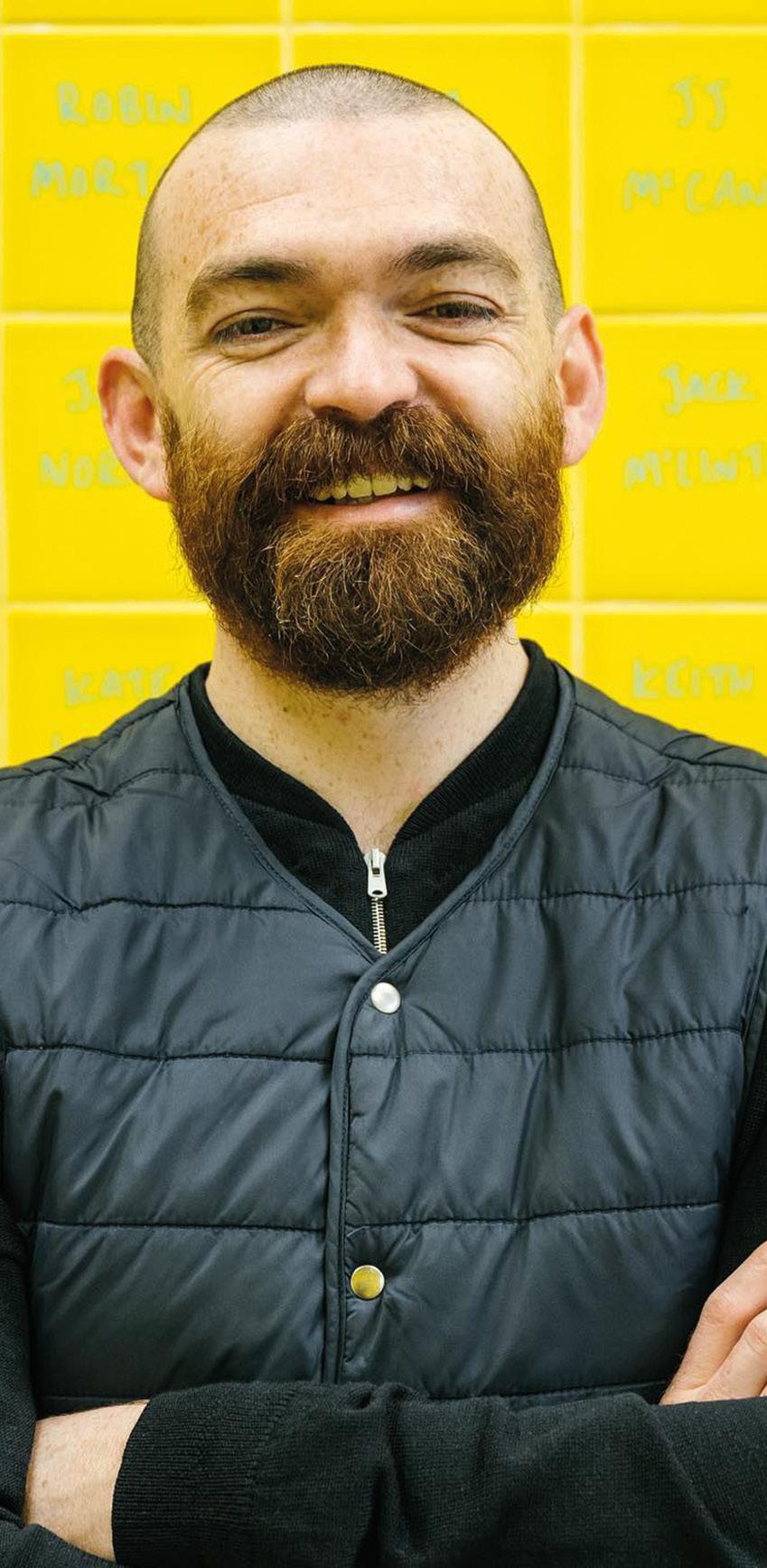
The Gender Recognition Reform Bill and its affects on trans people
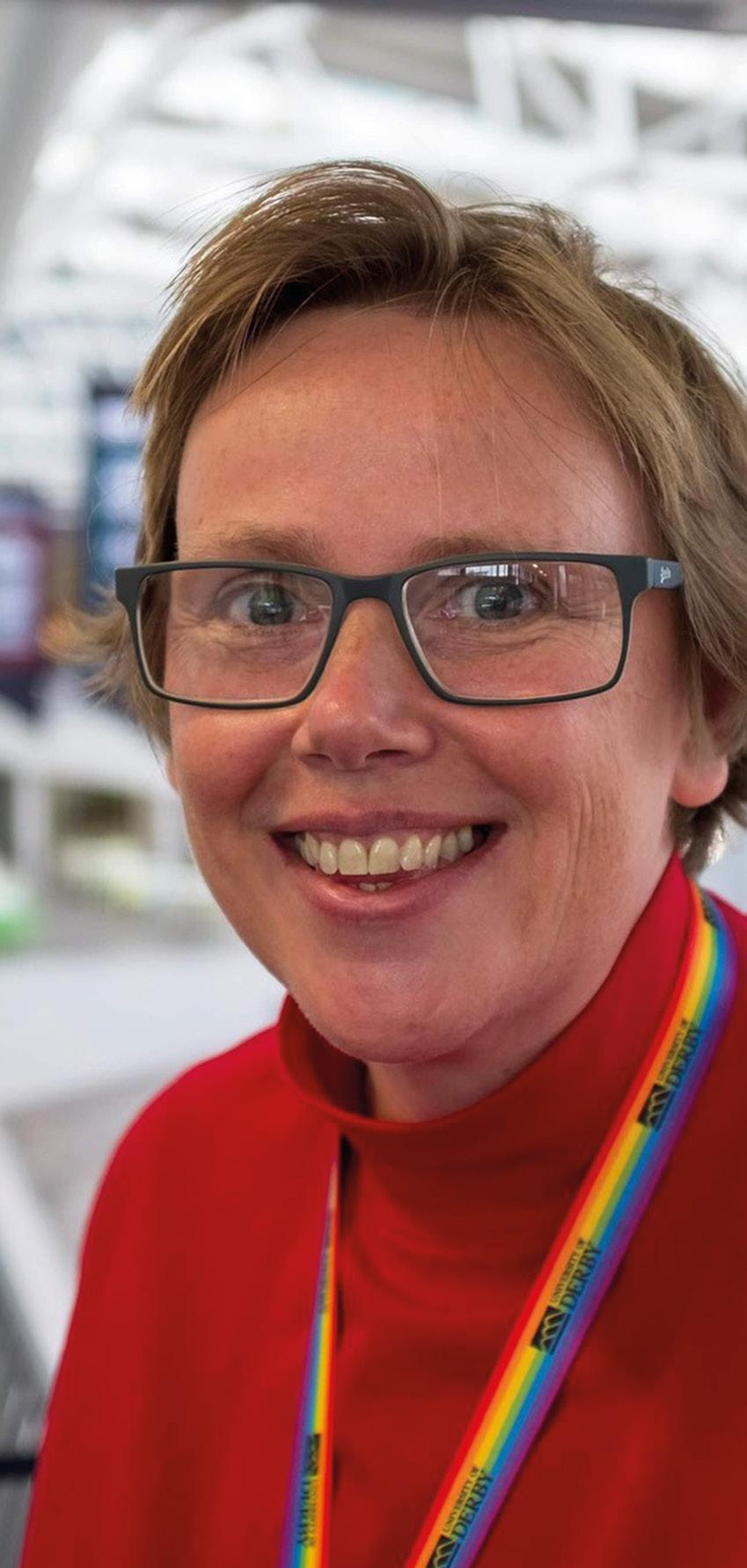
5 geyscotia.com | 8 26
Sarah BarleyMcMulley on housing a queer Ukrainian couple 10. 20. 22. 26.
5Queer Summer Romance Films

As queer people, we are hardpressed for romance films. In recent years, gladly, this has changed. With summer fast approaching here is a list of some amazing summer queer romance films to get you ready for your sunshine fling.
 Words by ARRAN PROCTOR
Words by ARRAN PROCTOR
Fire Island - 2022
Set on the iconic gay party island, a group of five queer friends make their way for a week of sun, sex, and soirées. Our lead, Noah (Joel Kim Booster), is a serial anti-monogamist and terrified of intimacy, a fear faced by too many queer people. The film touches on being an outcast in a place where being white, muscular, and rich is the norm. It shows the importance of friendship within the queer community, and it shows that love can blossom in the most unlikely of places.
 (Credit: Sony Pictures Classics)
(Credit: Searchlight Pictures)
(Credit: Sony Pictures Classics)
(Credit: Searchlight Pictures)
But I’m a Cheerleader - 1999

Released in 1999, Jamie Babbit’s cult classic But I’m a Cheerleader is a hilarious telling of a lesbian relationship sparked from a conversion camp. Not only does this film tell a queer love story it also dips its toes into really important issues. It finds a way to influence your opinion with comedy.


Beautiful Thing - 1996
Directed by Hettie Macdonald, this coming-ofage film revolves around two teenage boys, Jamie and Ste, who live in a London council estate and fall in love with each other. Beautiful Thing is a heart-warming and poignant film that deals with themes of love, acceptance, and the challenges of growing up gay in a working-class environment. This landmark film in British LGBTQ+ cinema is guaranteed to make you cry and fill you with queer joy.
Call Me by Your Name - 2017
A beautifully stunning film, adapted from the novel of the same name by André Aciman, that broke so many hearts when it was released in 2017. A coming of age story which sees a young man becoming more aware of his sexuality and ultimately falling in love with a man who is working for his father over the summer. Set in the north of Italy this film is as stunning in its visuals as it is heart-warming. Timothée Chalamet and Armie Hammer give equally outstanding performances. It is quintessential queer love but at the same time, you can’t help but cry.

Three Months - 2022
This coming-of-age comedy tells the story of a gay teenager who was exposed to HIV. Caleb (Troye Sivan) has to wait three months before he finds out if he has contracted the virus and, in that time, he meets someone going through the same thing. This film removes any stigma towards HIV, it plainly tells the story of a queer boy, his friendship, his family life, and a potential budding romance.
 (Credit: Sony Pictures Classics)
(Credit: Paramount+)
(Credit: Ignite Entertainment)
(Credit: Sony Pictures Classics)
(Credit: Paramount+)
(Credit: Ignite Entertainment)
Stag Barber: Haircuts for Everyone
We are all cut from the same cloth, so why pay a different price based on gender? Stag Barber is trying the chop the stigma of a gendered hair salon.
Words by ARRAN PROCTOR
air is everything. We wish it wasn’t so we could actually think about something else occasionally. But it is. It’s the difference between a good day and a bad day. We’re meant to think that it’s a symbol of power, that it’s a symbol of fertility. Some people are exploited for it and it pays your fucking bills. Hair is everything.” Fleabag was so incredibly correct with this outburst. Hair allows us to express ourselves, whether that be through a vibrant colour or an interesting style (whether or not it’s cool, edgy, chic, or French). Hair is specifically important for queer people, it allows us to show off our differences.

However, for a lot of queer people, it is hard to find somewhere that will cut your hair and not make you choose a gender you do not identify with. Enter Stag Barber. An Edinburgh hair salon with a bright
“Hyellow interior who are keen on de-gendering your haircut. Speaking to the owner, Murray McRae, who has been cutting hair for 18 years, it was interesting to find out
why his team made this change. They opened in 2014, amid the peak of the hipster barbershop experience, under the name Stag Barber Co.
After a few years they started picking up female clients who wanted a more so-called “masculine” haircut, as well as an increase in clients who identified as non-binary. After a while, this led them to make a plan to move to men’s and women’s prices, as Murray had only experienced the traditional salon process. This amounted to having a few clients give pushback about the change, leading the barber to change direction. “It wasn't until we'd spoken to our clients about the plan,” Murray explains, “there were a few people, which very gladly had actually said, ‘Well, hold on a minute. I'm a female, I've been paying this price, and you're now going to be charging me more because I’m female.’ And then there were also people who said, ‘actually I don't like to associate with either gender, and you're gonna make me choose.’”
A sudden realisation fell on them at that moment, “Why are we doing


8 | geyscotia.com
"Somewhere that doesn't pigeonhole you in a certain place based on gender”
this? Why does it have to be a gendered place?” They took some time to reflect on this feedback and made a new plan. “What we decided was to base the haircuts on hair length and we just took the gender away from it. And it doesn't matter who you are. If you want a short haircut, it's going to take this amount of time and it's going to cost this much money.” As soon as they made this change everything started to align, Murray exclaimed, “as soon as we did it, there was just this huge sense of like, oh, yeah, that's how it should be.”
They made the change in 2018, transforming their traditional barber aesthetic into a slick, yellow, contemporary hair salon. Since then, their business has boomed, they have opened new salons, and the response has been wholly positive. Murray highlighted how this change affected people, “What we found is that a lot of people were looking for us, everyone's been very thankful that they have the option now to come here.


Somewhere that doesn't pigeonhole you in a certain place based on gender.”


Murray mentioned it has even had a positive effect on the people who work at Stag. Explaining that for a handful of them they had felt excluded and othered in traditional salon environments, “We have a very weird eclectic group of legends who have all admitted that they don’t fit in.” He said that Stag has allowed them, “to wear what they want and express themselves how they want in their workplace.”
The salon owner wants Stag to be as inclusive as it possibly can be, they have even trained all their staff on cutting curly and afro textured hair.
Murray is excited to see his business grow and continue to allow people from all walks of life to feel comfortable when getting their haircut. With a brand-new salon opening up in Leith later this year it is thrilling to see such an accepting business flourish in a time of hardship.•

Left: Murray McCrae, the owner of Stag Barber.
Right: Stag is inclusive of all people, regardless of gender.
(Credit: Murray Orr)
geyscotia.com | 9

Scotland’s Transitioning and Transforming Drag Scene
Lucy is the host of Tracks, a DJ, and a former drag queen. She’s seen the queer scene change from being male dominated to an inclusive community for everyone. There is, however, still a long way to go
 Words
Words
by
ARRAN PROCTOR
Pictures by USAMA DIAZ
Scotland’s drag scene has an insane collection of talent. In the last year I have been to more drag shows than I could dare try count, the majority of these, however, were Tracks Monday at Subway Cowgate Tracks gave me the space to express myself without fear, stick a crop top on, and meet amazing new queer friends. One of these friends is Lucy, the host of Tracks. I interviewed Lucy for the first time about ten months ago and since then we have become good friends. Speaking to her this time, however, was going to be a lot different.
As I sat waiting in a small coffee shop at the shore in Leith, I had so many questions rushing through my mind for someone who had been a part of the Scottish drag scene for a good chunk of time. I wanted to hear about how much the drag scene has changed since she started – and wow, it has changed.
She enters smiling and the first thing I notice is her pink fluffy bucket hat. She orders a Diet Coke and a small cake, and we get chatting.
Lucy’s first introduction to the Scottish drag scene, like many people’s, was bumping into Alice Rabbit. In 2017 Alice’s show, The Rabbit Hole at CC Blooms, was one of very few drag shows in Edinburgh. But Lucy didn’t meet Alice at CCs but instead at a smoking area where Alice was looking for a bus to the gay bar. After this conversation Alice had convinced Lucy to go to her first local drag show, stoned and alone she decides to make an appearance. Through muted laughter she reflects on this night, “I put on a corset, a hair piece, and walked into the basement. No one else was there yet except from the acts, Alice, and Madison County. But within about 10 minutes of having a conversion with Alice and Madison, I realised, ‘oh wait everyone else here is just as stoned as I am.’” She giggles and exclaims, “It was perfect.” From there it snowballed into what would eventually become the drag
persona Havana Meltdown. Havana was a resident at The Rabbit Hole for close to five months alongside local legends Groundskeeper Fanny, Frans, and Violet Grace.
Back then the scene was a lot different for drag artists who identified as female. So, for Lucy at the time drag wasn’t a big deal. She explains what her thought process was then, “If I were to get fired from The Rabbit Hole,” which she eventually did, “I’m not going to do drag again. Drag was just a silly goofy thing I did with my pals and if I’m not doing it in the basement of a gay bar with them, I’m not going to do it.” Those ended up being very famous last words. As instead of quitting she became part of a supergroup of femme drag performers by the name of Lunar, and eventually the host of Scotland's biggest drag show.
As with many careers, the Scottish drag scene was highly dominated by those who were masc presenting outside of drag. Lucy explained that this made it really hard for femme drag artists to make a name for themselves, “back then it was one of those things that (for femme drag performers) your platform really depended on who you were associated with.” For her it was being part of The Rabbit Hole, she continues, “You could kinda see femme visibility in the scene, but it was very controlled.” Reflecting on that time she even remembers for the first six to seven months of her doing drag she was referred to as ‘Alice’s Pal’. For many reasons that feels offensive.
Lucy tells me the turning point›

12 | geyscotia.com
“Violence against trans women should be your number one concern”

13 geyscotia.com |
Lucy is the host of Scotland's Biggest Drag Show (Credit: David Stewart)
for femme drag performers in Scotland to the date – Clash of Clans 2018. This was an annual event at the end of the year in Glasgow at Delmonica’s. It would feature drag haus’ and groups from all over Scotland, performing group numbers and showcasing their varieties of drag.

“I put together a supergroup of seven of the best femme performers that I had collected from throughout the year.” The seven in question were Loki, Ivy, Erin Burgh, Kathryn Creepshow, Cotton Storm, Purina Alpha, and Ha-
vana Meltdown (Lucy). I’ve seen videos of this night a couple times and it is by far one of the most iconic moments in the Scottish Drag scene history books. Starting with a quote from RuPaul saying that trans women and women can’t do drag because “it loses its sense of danger and sense of irony.” A pretty cutthroat way to start a mix and from there the audience ate it up. Looking back in glee Lucy tells me, “That night, we blew the roof off the place we were easily the best of the night. Everyone was chanting for us; everyone was losing it. And we were just this plucky little group of femme artists who hadn’t really been taken seriously.”
“That’s why I felt like 2018 was the turning point for femme drag,” she explains, “I think
it really set the tone for what femme drag looks like now.”
Whilst from there femme drag in Scotland has catapulted there are still a lot of things that trouble Lucy for femmes in the drag scene. Namely, the way trans people are being treated, not just in the country as a whole but in the scene they call home as well. With immense passion Lucy details her thoughts on this, “(Violence against trans women) should be your number one concern. With the increasingly hostile world towards trans women, particularly when a lot of it is coming from within the queer scene, other femme people within the queer scene need to be mindful and be protective of that, because TERFs are queer women in our community.” As a fight back against TERFs within the community Lucy make this clear, “Other cis-queer-women in the community
14 | geyscotia.com
›
“2018 was the turning point for femme drag”
Above: Havana Meltdown in 2017 at Polo

Lounge
(Credit: Polo Lounge) Left: The Rabbit Hole (Top row left to right)
Groundskeeper Fanny, Frans, Eli Buck, Violet Grace, Fawna

Love. (Bottom row) Roché
Rabbit, Havana Meltdown, Alice Rabbit, JFR, Diana Morphine
(Credit: CC Blooms)
15 geyscotia.com |



16 | geyscotia.com
need to be the ones putting themselves in as the barrier and actively using the position and power they have by being someone who will not be silenced by these people.”
In all my time knowing Lucy it is incredibly clear that she wants to do the best she can to support as many people around her as possible. She wants to uplift the voices that are usually diminished, and she wants the scene to be open and accepting of every queer person. She explains, though, that this isn’t always as easy as it is said, “I think one of the hardest things about being a producer is that I try and create an environment that’s good to be creative in and good to show your art in, and I think feeling safe, comfortable, confident, is really important for that.” In her time as a producer and show runner she has faced some obstacles, “no matter how much I can, you know, wrap the place in cotton wool and make it as safe a place as possible for trans people. The outside world will affect that. No matter how much you can try and create a space for trans joy, trans safety, and trans euphoria, the outside world is always there.”
Despite all of this the Scottish drag scene has still come a long way in the inclusion and acceptance of the trans people and cis-women within it. “I do think things have changed a lot now,” Lucy tells me with an air of relief, “I think people are a lot more willing to have women in the room, when it comes to big chats or conversations about projects, people are a lot more keen to have women in the room.” As the Scottish drag scene continues to move and progress Lucy is glad to see that all women are being taken on that journey, “The fact that there’s now women making their own spaces, predominantly trans women making their own spaces, and those are the spaces that are becoming popular or becoming the mainstream spaces that people want to be in. That’s a good change.”•

17 geyscotia.com |


An Equal Marriage Debate? In 2023?

Are we going back in time? Is this actually happening? Why can’t we have anything? Those are just a few questions that may be spiralling in your head as the search for Nicola Sturgeon’s replacement has resparked a debate on equal marriage.

 Words by ARRAN PROCTOR
Words by ARRAN PROCTOR


Within one week of Nicola Sturgeon resigning, it was brought right to the centre of the leadership contest that one candidate, Kate Forbes, had an issue with equal marriage. Telling various interviewers that if she was an MSP during the vote on the Marriage and Civil Partnerships Act 2014 she would have voted against it. Claiming it is against her religion to practice this kind of marriage.
Not only is a possible future leader of a country delegitimising thousands of marriages around the country, but she is also sparking up a debate that was meant to be over nearly ten years ago.

Forbes, an evangelical Christian and member of the Free Church of Scotland, has said she is also against the Gender Recognition Reform Bill and is anti-abortion. It seems inconceivable that a leader of a progressive party like the SNP would be against such basic human rights. Whilst she has said she would never overturn any legislation that may impact the lives of LGBTQ+ people, it could mean she is slow at acting on legislation that makes life easier for queer folk, like banning conversion therapy or making access to gender-affirming healthcare quicker to access.


Vic Valentine, manager of Scot

up to support trans people, commented on the current leadership debate, “While for now this might be a contest about who leads the SNP, ultimately whoever is successful will go on to lead the country. LGBT+ people are a part of Scotland’s communities, and trans people are your friends, family, colleagues and neighbours. It is absolutely vital that the future First Minister takes decisions in the interests of everyone, and rather than seeing protecting and improving trans people’s lives and rights as an optional add-on, understands that doing so is a small but important part of leading a Scotland in which everyone can thrive.”
Whilst Forbes has made quite the splash on this, the other two candidates have also faced controversies on this issue or similar. Humza Yousaf most notably didn’t attend the vote for equal marriage

in Scotland, a few rumoured this was down to religious pressures, but the leadership hopeful ensures it wasn’t. Ash Regan, on the other hand, is majorly opposed to the Gender Recognition Reform Bill, even resigning from her role in government over it.
It seems somewhat dystopian that in a leadership contest, for a party that is meant to be progressive, these basic human rights are being debated. Especially for a party that prided itself on being entirely inclusive of LGBTQ+ people.
Why is it, as LGBTQ+ people, we have to continually fight for our place at the table, to be recognised as human beings, and to have our lives constantly debated? Will there ever be a time when we can put our feet up and live our lives without fear?
Whoever wins this leadership needs to maintain the principles of The SNP being an open and accepting party, they need to restore the little faith queer people have for the party, and they need to ensure they are on the correct side of history.•
 Ash Regan, Kate
SNP leadership candidates.
(Credit: Scottish Government)
Ash Regan, Kate
SNP leadership candidates.
(Credit: Scottish Government)
"It is absolutely vital that the future First Minister takes decisions in the interests of everyone"
Stop Denying Us Basic Human Rights
How has a piece of legislation that only affects 1% of the population, a bill that would make the lives of an incredibly marginalised group a little bit easier been blown so far out of proportion? The far-right, and even some left-wingers, have brought up irrelevant rebuttals and have created a toxic culture war. But I am a cis-man, this bill doesn’t affect me, so my opinion doesn’t matter. This bill does, however, affect my friends and my LGBTQ+ siblings. I reached out to three trans people from around Scotland to find out what the Gender Recognit and its subsequential vetoing means to them.
Lorelai
What were your thoughts on the GRR Bill?

“What we got on the table and what we have campaigned for is very different. Trans activists, over the years have always been advocating for self-identification, the right to self-identify as male, female, non-binary. But the Scottish Government watered it down. We're not even getting the right of self-identification, per se, we're just getting it a little bit easier. We still have to apply for a gender recognition certificate, but it's much more easier.”
How did you feel when the bill was vetoed by the UK Government?
“Now what we are getting is Rishi Sunak’s government blocking it with the section 35 order, that's kind of fucked up. The Tories are inherently transphobic. What we were getting was mere scraps. And even then, you're denying us that, that shows how much you hate us that even that one shred of autonomy we would have had over our lives you are not giving us. I personally feel it is a very exhausting state, we fought so long and hard to at least get some sort of recognition and yet we’re still being denied.”

22 | geyscotia.com
The debate surrounding the reforms to the Gender Recognition Act (2004) (GRA) has dominated Scottish media for several years now. But its effects on trans people around Scotland has been immense.
(Credit: Angelo @stuckinabody)
Krystal
What were your thoughts on the GRR Bill?


“My views on the sort of bill that was proposed is that it was needed, it was necessary. And it was an amazing thing that the SNP tried to do, it gave a lot of trans people around Scotland a lot of hope that we were moving in the right direction, and that we were basically just gaining fundamental rights that we need and have been denied for so long.”
How did you feel when the bill was vetoed by the UK Government?
“When the bill was vetoed, we kind of lost all hope in that we didn't understand why it had been vetoed. It directly affects a lot of trans people, because, you know, we are basically being told that we're not valued, that we don't matter, essentially, and that, our way of life, if you like, is not taken seriously. And that we shouldn't be allowed the kind of fundamental rights that everyone else has to be able to identify as who they are and be able to live their life authentically. We don't have that, I guess privileged, in a sense.”


How did you feel when the bill was vetoed by the UK Government?
“This bill getting blocked at this time is already terrible. It's already coming at such a terrible point in loads of people's lives. For me, specifically, it's definitely a really confusing time for this to happen. As somebody that's very early into my transition, I've actually only just been able to get onto the NHS waiting list for HRT and trying to figure out the direction I kind of want to go in with my physical transition and trying to figure out ways that I can make it easier for myself. It feels like when things like this come up and there's the potential for them to be made so much easier than they would have been before, and then they're just gone like that, it makes it feel pointless. It makes it feel like the things that you're actively trying to do aren't really worth doing when they are. But what can you really do if it's just going to consistently get blocked every time?”
23 geyscotia.com |
Rey
(Credit: Usama Diaz)
(Credit: Rey Reeves)
GRA Timeline
2002 2004 2016


Christine Goodwin, a British trans woman and former bus driver, in 1990 underwent sex reassignment surgery. Due to the fact that trans people were unable to change the sex on their birth certificate, she wasn’t allowed to receive her state pension at the same age as other women. She would eventually challenge the UK Government in the European Court of Human Rights over this issue. After this, the ECHR found there were multiple violation in UK law and ruled in favour of Goodwin. This led to the UK Government having to introduce legislation to comply.

Over ten years later, with the Tories in power and Theresa May at the helm, Westminster’s Women and Equalities Committee publish a root and branch review of the GRA. The outcome of this review leads to plans being made to reform the legislation.

With Labour in Government the UK passed the Gender Recognition Act. The passing of this act meant that for the first time, trans people were able to apply for a gender recognition certificate and be able to change their legal gender on all legal documents. The act set out a series of criteria: needing a diagnosis of gender dysphoria from a doctor, having lived in their acquired gender for more than three years, on top of many others.
 European Court of Human Rights
(Credit:Alfredovic)
Tony Blair (Credit: Chatham House)
European Court of Human Rights
(Credit:Alfredovic)
Tony Blair (Credit: Chatham House)
The Scottish Parliament (Credit:
Theresa May (Credit: Jay Allen)
SNP return to Government with a Scottish Greens coalition. As part of the deal, the two parties agreed to introduce a Gender Recognition Reform Bill before the end of May 2022.

In June the European Commission released a report that classified the legislation for gender recognition of 28 European countries into five categories based on the barriers to access. The UK’s GRA was placed in the second last category, labelled as having “intrusive medical requirements.” However, with Boris Johnson now Prime Minister, the UK Government scrapped plans of reforming the Gender Recognition Act. Scotland’s GRA Reform was delayed due to the pandemic, with plans to continue after the 2021 Scottish Parliament elections.

2nd March saw the introduction of the bill to the Scottish Parliament, by Shona Robison, the Cabinet Secretary for Social Justice, Housing and Local Government. Three stages of consultation happened, and the bill was finally passed on 19th December. The bill would lower the age of being able to access a GRC, it would de-medicalise the process, and reduce the waiting times of living in their acquired gender to six months. The bill passed with cross-party support.
In Scotland, the Scottish Government published its review of the GRA with intentions to reform it. They state that the current GRA is “out of date” and “intrusive and onerous”. In Westminster, Justine Greening, the Minister for Equalities at the time, considered reforms to the same degree as the Scottish Government, wanting to de-medicalise the process with self-identification.

In January, Scotland Secretary Alister Jack announced that he was going to veto Scotland’s GRR bill using Section 35 of the Scotland Act 1998, which would prevent the bill from proceeding to royal assent.

2017
2020
2021 2022
2023
(Credit: Scottish Greens) Protesters outside Holyrood (Credit:Arran Proctor)
(Credit: Lynne Glazzard)
From Ukraine to UK: journey to a new home

Sarah is a fighter. She is always determined to take that first step to make a difference, whether that is big or small. So, when the opportunity arose to host an LGBT Ukrainian refugee couple Sarah and her wife, Helen, were happy to accommodate.
Words by ARRAN PROCTOR

26 | geyscotia.com

 (Photo credit: Sarah Barley-McMullen. Graphics credits: MographMotions, DesignPanoply, Rawpixel)
(Photo credit: Sarah Barley-McMullen. Graphics credits: MographMotions, DesignPanoply, Rawpixel)
Over 8.1 million Ukrainians were displaced last year after Russia invaded Ukraine. These refugees of war fled all over Europe and some of them came to the UK. Yulia and Tetiana were two of them. They are a lesbian couple who were previously living in Kyiv. A country that not only doesn’t recognise samesex marriage but is under attack from a country that demonises and prosecutes queer people for just being themselves. The couple was welcomed in with open arms by another lesbian couple in Derbyshire, Sarah and her wife Helen. Sarah tells the entire story in great depth, from the adjustment period, the lessons they learned along the way, and the acceptance of what she had taken for granted in such an accepting country.
Sarah lives in Belper, a small town in Derbyshire. She tells me that for a long time, she has wanted to make a difference, and in many ways she has. From setting

up an LGBTQ+ Pride event in her local community to being a Stonewall Role Model. She tells me, “I've always seen the need for people to take that first step forward. I think a lot of people want to be involved in change. And they want to be involved in making a differ-
ence, but they don't make that first step. They always need someone to follow.” Being someone who was brought up with a Vicar as a father and an aunt who was severely disabled, she learned to be that per-
son from a young age. When the invasion of Ukraine happened, and the UK Government announced a scheme to allow families to host Ukrainian refugees, Sarah and Helen were keen to help out the best they could. Sarah explained, “There was a lot of talk about the Homes for Ukraine scheme, and how the government would support people and pay people to host and things like that. But nothing was mentioned about people with disabilities or LGBT people. So, my wife and I decided that we would look into hosting, but we wanted to host an LGBT couple specifically.” They put out feelers, but the attempt was hopeless. Until an article in the BBC reached a woman with friends in Berlin, these friends were Yulia and Tetiana, who were hoping to seek refuge in the UK. Sarah explains why hosting a queer couple was so important, “I think, because it's always the white, heterosexual, cisgender, able-bodied, and usually men, not always, but usually men that are represented
28 | geyscotia.com
"I've always seen the need for people to take that first step forward"
Sarah used to run the Youth Work and Community Development degree at the University of Derby. (Credit: Sarah Barley-McMullen)
and talked about openly. And I just got so fed up with that.” She wanted to ensure that someone from a marginalised group was safe.
In May 2022, the couple arrived at Sarah and Helen’s home. The adjustment period was interesting, Sarah tells me. Explaining that the adjustments they had to make were twofold, firstly working out how they were going to live with people they had never met before. For the first two weeks, as the Ukrainian couple’s trauma started to fade, Sarah and Helen treated them like guests, but that wasn’t a healthy way to continue that living situation. “We knew that if we were going to be able to do this successfully,” Sarah explains, “we had to feel that we were on as equal a footing as we could possibly be in that situation.” Secondly, was the adjustment that just Yulia and Tetiana felt. The couple was suffering from imposter syndrome, they didn’t necessarily believe they were any less persecuted than
anyone else. That was until they saw the difference between being queer in the UK and Ukraine. “They realised all the things they could suddenly do,” Sarah tells me, “That they'd never been allowed to do in Kyiv. And most of that was, you
got involved but this police involvement was nothing like the Ukrainian couple had ever experienced - it was positive. Sarah describes why that was so pivotal for them, “That was a hugely affirming experience for Yulia and Tetiana. It was a relief for Helen and me but it was really affirming for them because, you know, the police were on their side. They weren't just there to react.”
know, openly be a couple and hold hands and talk about each other and introduce each other as a couple.” However, within one week of the couple arriving at Sarah and Helen’s home, the four of them experienced a hate crime, in the form of a neo-Nazi ripping down a pride flag on their property. The police
The whole experience brought on a myriad of different emotions for Sarah and Helen. Sharing your home and your safe space with people you hardly know is sure to be a difficult task. Looking back, Sarah tells me how she felt, “It was hard sharing our home, we've got quite a lot of space. So, it meant that they could have their own space, we had our own space, and then we have shared space. And it was really hard knowing that there was always someone else there that we knew, but we didn't know very well. And that at times got a bit claustrophobic.”›

“They realised all the things they could suddenly do”
Sarah now chairs Belper Pride, they had their first pride in 2022
(Credit: Sarah Barley-McMullen)
With a small chuckle and a slight hint of irritation, Sarah explains that she sometimes felt like a nagging parent, "It was when they constantly didn't clean up after themselves and just didn't look after the things that we'd worked really hard to be able to have.” Sarah, who is celiac, points out one example, “I would ask them to wipe up all the crumbs on the breadboard after they’d used it. They’d do it for two days and then they stopped doing it. We turned into these parents because of their behaviours, and they became like teenagers. And we were nagging them.”
There was, of course, a massive silver lining above it all – being able to be part of such a heart-warming journey. “It was amazing,” she exclaims, “I mean, there aren't really any words to describe seeing two adult women suddenly being so open about their sexuality and gender identity. And other people just celebrating with them.” Seeing that unfold made Sarah look back at her own life and think about the things that she had maybe taken

for granted, “I think it's the small things that as a gay woman, I take very little for granted in terms of my visibility. And the way I have to protect myself at times. But I think, the privilege of seeing these two people, literally, have their relationship just flourish sud-
crease their chances of being able to stay. As they start their new life together in the small town of Belper it is good to know they have the support of the community behind them. When they got married the story reached the BBC, “So many people have been stopping them in the streets, even in Derby, congratulating them, and they've absolutely loved it.” Having witnessed all this happen Sarah says, “That has felt like a massive win for diversity and inclusion in society. So yeah, that's been brilliant.”
denly, because they could be who they really were within a community that loved the fact that they were living in their community.”
Since the beginning of March 2023, Yulia and Tetiana are now married, they’ve both got new jobs, and they have moved out of Sarah and Helen’s home. The pair are hoping to stay in the UK after their settlement status expires, they secured two jobs that help the community which will hopefully in-
For Sarah and Helen, life goes back to normal, their home is quieter, and, I can only guess, a lot tidier. But looking back at the whole experience Sarah has found an ever-growing love for being queer, “I would absolutely hate to be straight,” she tells me through muted laughter, “I couldn’t trailblaze anything, there's such a creative energy and there's such a deep passion and desire for inclusion. So, I think it's brought me a lot of joy. It brings me courage, being gay gives me a lot of courage.”•
Below: Around 5,000 people showed up to first Pride in Belper (Credit: Sarah Barley-McMullen)
"Being gay gives me a lot of courage"

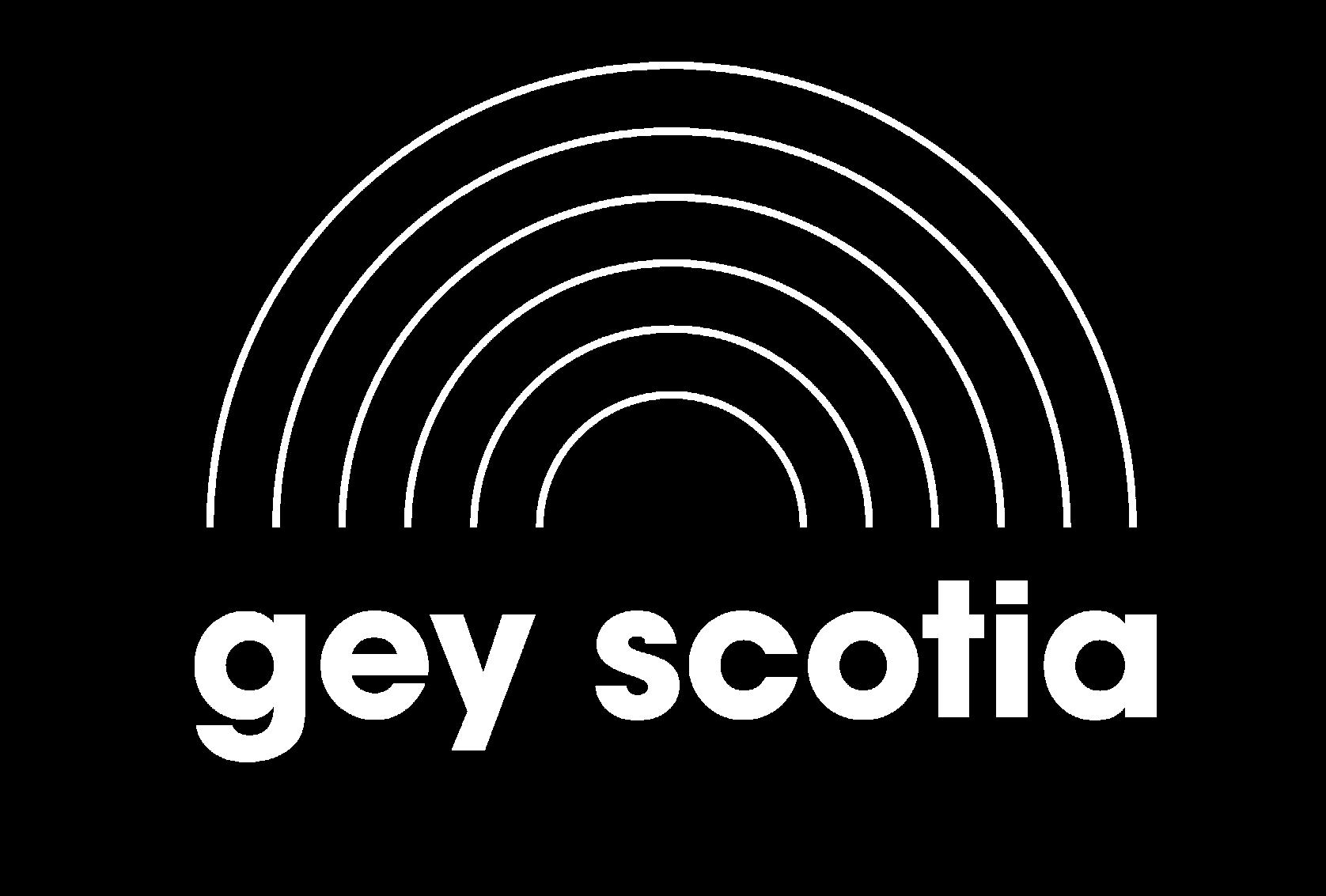
read more at geyscotia.com










 Words by ARRAN PROCTOR
Words by ARRAN PROCTOR
 (Credit: Sony Pictures Classics)
(Credit: Searchlight Pictures)
(Credit: Sony Pictures Classics)
(Credit: Searchlight Pictures)




 (Credit: Sony Pictures Classics)
(Credit: Paramount+)
(Credit: Ignite Entertainment)
(Credit: Sony Pictures Classics)
(Credit: Paramount+)
(Credit: Ignite Entertainment)









 Words
Words













 Words by ARRAN PROCTOR
Words by ARRAN PROCTOR







 Ash Regan, Kate
SNP leadership candidates.
(Credit: Scottish Government)
Ash Regan, Kate
SNP leadership candidates.
(Credit: Scottish Government)










 European Court of Human Rights
(Credit:Alfredovic)
Tony Blair (Credit: Chatham House)
European Court of Human Rights
(Credit:Alfredovic)
Tony Blair (Credit: Chatham House)







 (Photo credit: Sarah Barley-McMullen. Graphics credits: MographMotions, DesignPanoply, Rawpixel)
(Photo credit: Sarah Barley-McMullen. Graphics credits: MographMotions, DesignPanoply, Rawpixel)













